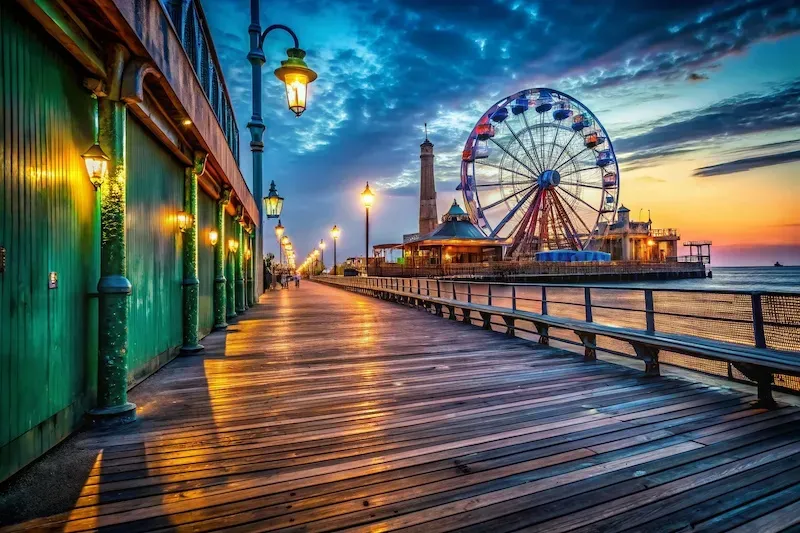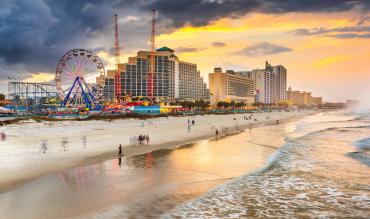Bright lights, big money, major entertainment, and plenty of casino gambling. While many may think of Las Vegas when it comes to testing out some blackjack strategy or craps strategy, and dropping a few bucks in a slot machine, there is another huge American destination that helped move casino gaming beyond Sin City.
New Jersey legalized gambling in Atlantic City in 1976 and cemented a long history of underground gaming into a new regulated industry. For a time, “America’s Playground” even gave Las Vegas a run for its money.
The southern New Jersey city is still home to several casinos and has been in the gambling business since the first property opened in 1978. Here’s a quick look at the history of Atlantic City casinos.
Underground Gaming
Legalized casinos in the Garden State didn’t come without some setbacks. A voter referendum in 1974 to legalize casinos in Atlantic City was initially defeated, but a second effort passed two years later.
The approval came after the state had a long history of underground casino gaming. That included a local sheriff offering some gambling and entertainment, despite it being illegal, right on the Jersey Shore.
“America’s Playground, Atlantic City, was for decades a ‘shore bet’ for illicit gambling,” David Schwartz notes ub the book Roll the Bones: The History of Gambling. “Though it was promoted as a family resort, as early as the 1860s those who knew where to look could have some very adult fun gambling.
“Under the de facto rule of Enoch “Nucky” Johnson, who rose to power as the sheriff of Atlantic County in 1908, wide-open gambling was viewed as a boon to the tourist trade.”
Later, a federal investigation revealed that Johnson allowed gambling and bootlegging run by the mob in return for a 10% cut of the proceeds. The investigation found that as many as 25 underground casinos were in operation offering casino games before he was finally sent to prison in 1941. However, many casinos stayed open, but became more concealed.
The legalization of casinos in 1976 changed that and Atlantic City's first casino, Resorts International, opened on May 26, 1978.

Legalized Casinos Flourish
Atlantic City has a lot of things going for it when it comes to legalized casinos. The location on the ocean and beautiful beaches made the city a great getaway for families looking for some summer fun. The boardwalk allowed for some beautiful views and offered plenty for vacationers including shopping, dining, amusement park rides, and more.
Adding casinos allowed for parents to bring the kids – hitting the beach and boardwalk with the family by day and then allowing some time for the adults to head to the casino by night to play roulette, hit the dice tables, or take in a show.
Seeing that the voter referendum might pass, Resorts International purchased tracts of land in the city including the Chalfonte-Haddon Hall resort complex.
The company also owned a casino in the Bahamas and when the referendum passed, Resorts hit the ground running and opened a casino quickly. Caesars Boardwalk Regency (later known as Caesars Atlantic City) followed a year later with The Brighton, later renamed the Sands, opening in 1980.
Harrah’s and the Golden Nugget also opened in 1980s, followed by several more throughout the ‘80s including the Tropicana, the Claridge, the Hi-Ho, Trump Castle, and the Showboat,
The current U.S. president and former New York City real estate developer had a major impact in Atlantic City, opening Trump Taj Mahal in 1990 and billing the property as the “eighth wonder of the world.”
“The scale … is what brings the people,” Trump told ABC News in 1990. “The opulence, the size, the everything is really what’s going to make the Taj Mahal the most successful hotel anywhere in the world.”
Trump took over the project after Resorts couldn’t complete construction and Michael Jackson was a guest of honor at the property’s grand opening. The Taj Mahal became known as the best place to play poker for a time, The Taj was a regular home for poker legend Phi Ivey and hosted the U.S Poker Championship from 1996 to 2010. Trump’s footprint extended even further in Atlantic City and he also owned Trump Plaza for a total of three casinos at one time.

Rapid Growth & Decline
Until Atlantic City legalized casinos, the only place to legally gamble in the U.S was in the state of Nevada. Attracting gamblers from across the eastern seaboard became an economic boon for the city beginning in the 1980s.
Gaming revenue increased from $325 million in 1979 with just two casinos to almost $1.2 billion by 1981. By 1987, AC had become the most-visited city in the U.S. with over 20 million visitors annually. The town by the Jersey Shore was now on the map, and gamblers kept flock to the gaming tables and slots.
Atlantic City was a major competitor with Las Vegas, almost equaling the city’s revenue of $2.4 billion by 1987 with far fewer casinos. According to the University of Nevada Las Vegas, Atlantic City gaming saw average growth rates of an astounding 55% from 1978 to 1985.
By the 2000s, however, that rate had slowed significantly. While the industry peaked with 12 casinos, the 1990s and 2000s saw some changes as other regions began legalizing casinos. States like Illinois, Indiana, Louisiana, Mississippi, and Missouri brought in riverboat casinos in the 1990s and gamblers no longer had to book trips to Las Vegas or Atlantic City.
Other states, such as New York, Massachusetts, Pennsylvania, Oklahoma, and others around the country now offer full-scale casino resorts. The Atlantic Club, Showboat, Trump Plaza, and even the Taj Mahal all eventually closed and the city now boasts just nine casinos.
In 2013, New Jersey officially legalized online gaming and online poker, becoming a leader in the industry in the U.S. However, in recent months online gaming has eclipsed live casino gambling.
In March, the state’s casinos produced $230.9 million in revenue, falling 3.7% from $239.8 million the same month in 2024. By contrast, online operators brought in $243.9 million, up 23.7% compared to $197.2 million for March 2024. That trend has led to some concerns among legislators and casino employee unions about what can be done to keep gamblers coming into their properties.
“As lawmakers continue to proceed with the annual state budget process, representatives in the New Jersey Legislature must understand the perilous economic situation at hand for my members, and indeed all workers in Atlantic City,” Unite Here Local 54 President Donna DeCaprio said in 2024.
“Not only is the overall in-person revenue troubling — but the size of the declines at some of the individual properties portends some serious instability for thousands of workers. The legislators need to take this into consideration as they consider policies that could compound the downward trends.”
Where does the industry go from here? Atlantic City has an uphill climb now faced with so much competition for some of American gamblers’ bankrolls. It seems almost every state has a casino industry, with just a few exceptions. Even more are considering expanded gaming and gamblers can also now easily place sports bets on their phones from almost anywhere.
While the gambling mecca may not be what it once was, Atlantic City can be remembered as the outpost that kick-started the American casino boom. And the Atlantic City boardwalk and beautiful beaches can still be a great spot for a casino vacation getaway.


